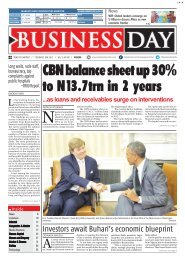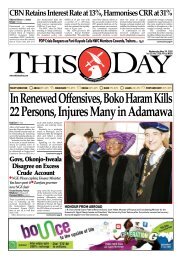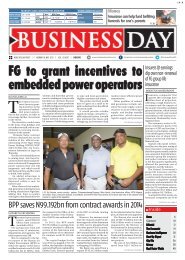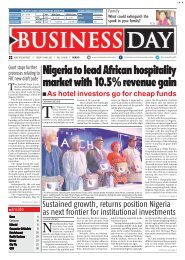business0521
Create successful ePaper yourself
Turn your PDF publications into a flip-book with our unique Google optimized e-Paper software.
Thursday 21 May 2015<br />
34<br />
BUSINESS DAY<br />
PERSPECTIVE with Tolulope Aderemi<br />
LegalBusiness<br />
The Petroleum Host Community Fund: A disincentive?<br />
Recently, the National Assembly resumed its debate<br />
on the controversial Petroleum Industry Bill (popularly<br />
referred to as the PIB). In its clause-by-clause review,<br />
the Lower Chamber (“The House”) reconsidered the<br />
percentage share allocated to the ‘host community’ from<br />
10% now to 7.5% levy on oil & gas profit.<br />
At Section 116 to 118 of the PIB, the Host Community<br />
Fund (“HCF”) is expected to cater for the mitigation of<br />
all negative environmental impacts on host communities<br />
arising from exploratory activities of oil companies.<br />
This invariably is seeking to create an independent fund<br />
separate from whatever interventionist funds already<br />
in existence; a salient point which has been further<br />
considered below.<br />
With a few more weeks to left for the 7th Assembly,<br />
it is unlikely that this bill will become law. If that is the<br />
case, it is therefore important that the 8th Assembly set<br />
out to quickly appreciate the philosophy underpinning<br />
many of the provisions of the bill (the Host Community<br />
Fund being one) and their consequential effect(s) on<br />
the industry as a whole, if it ever becomes law in its<br />
present form.<br />
The Ownership Theory:<br />
Today (in Nigeria), it does appear that there is an<br />
advocacy that the ownership of crude oil should be<br />
treated in the same way as it is in the United States of<br />
America. In the United States, rights to crude oil may be<br />
owned by private individuals, corporations, or by local,<br />
state, or federal government. That is not the case under<br />
the Nigerian Statutes. Section 44(3) of the Constitution<br />
of Federal Republic of Nigeria (as amended) vests the<br />
entire ownership and control of all minerals, mineral<br />
oils and natural gas in, under or upon any land in Nigeria<br />
or in, under or upon the territorial waters and the<br />
Exclusive Economic Zone in the Federal Government.<br />
In Malaysia, unlike Nigeria, the Petroliam Nasional<br />
Berhad (Petronas), holds exclusive ownership rights to<br />
all oil and gas exploration and production projects, and<br />
is only subject to the Prime Minister’s control. In Ghana,<br />
Angola and like Nigeria, the ownership and control of<br />
oil & gas is vested in the government.<br />
Moreover, Sections 44(3) of the 1999 Constitution as<br />
well as Section 1 of the Petroleum Act, Cap C10 Laws<br />
of the Federation of Nigeria, 2004 (“The Act”) vests the<br />
entire ownership and control of all petroleum in, under<br />
or upon any lands to which Petroleum Act applies, in the<br />
State. The Act further extends its application to all land<br />
(including land covered by water) which is in Nigeria;<br />
is under the territorial waters of Nigeria; forms part of<br />
the continental shelf.<br />
Furthermore, the use of the word “State” is defined<br />
by the Black’s Law Dictionary 6th Edition, page 1407<br />
defines a State as either to body politic of a nation (e.g.<br />
United State). Similarly, the Interpretation Section of<br />
the Petroleum Act has defined the word State to mean<br />
‘State, except in Section 1 of the Act means a state of the<br />
Federation’. Apart from Section 1 of the Act, the word<br />
‘State’ was also used six times within the Act either as a<br />
verb or reference to the constituent part of the Federation.<br />
It is therefore no doubt that the reference to a State<br />
in both Section 44 (3) of the CFRN and 1 of the Petroleum<br />
Act vests the ownership and control of petroleum in the<br />
Federal Government.<br />
The above notwithstanding, one must not trivialize<br />
the environmental damage oil & gas operation may<br />
have caused the Littoral region. Again, it must be argued<br />
that it was for that reason that each Littoral State gets<br />
additional 13% derivation over and above other nonproducing<br />
States, individual GMOU’s entered with the<br />
host communities etc. To consider AT ALL the Host<br />
Community Fund, the 8th Assembly must seek answers<br />
to the following questions:<br />
Has it been established that the 13% Derivation allocated<br />
to each Governor of a producing State is inadequate<br />
for economic and social infrastructure?<br />
Have the Governor’s dutifully accounted for the<br />
disbursement of the Funds to specific infrastructural<br />
projects?<br />
Does the government have an infrastructural development<br />
monitoring Group (such as the Good Governance<br />
Tour) to monitor projects in the States benefitting from<br />
the 13% Derivation?<br />
Has it been proven that both the allocation of 13% as<br />
well as the individual GMOU’s are grossly inadequate<br />
to compensate for the damage caused by exploration<br />
and production activities?<br />
Will the Host Community Funds not prevent accountability<br />
of each State as regards the way and manner its<br />
13% Derivation had been expended?<br />
How will the HCF be administered and are there<br />
check-mechanisms to monitor performance of development<br />
of social and economic infrastructure?<br />
The above in no way undermines the rights to good<br />
life of the people living in Littoral States, however, the<br />
Buhari-led administration/8th Assembly must also<br />
guide itself properly to ensure that it is not misled to<br />
encouraging corruption, recklessness and wasteful<br />
spending; it, having not been satisfied that the provisions<br />
already made (for the compensation for these<br />
environmental damage) have proven inadequate such<br />
as would warrant the establishment of the HCF.<br />
Digital Oilfield in Nigeria<br />
The process of oil exploration by both Nigerian oil<br />
companies and International Oil Companies is saddled<br />
with a lot of challenges both infrastructural and otherwise.<br />
Before now, traditionally, accessing information<br />
from pumps, lifts, wellheads, and other equipment’s<br />
used in oil exploration was typically a labor-intensive<br />
process; workers were required to drive from platform<br />
to platform and physically gather data with one person<br />
stationed at each platform to monitor performance.<br />
Such a procedure not only puts workers at risk in the<br />
line of duty, it is also time-consuming, and data obtained<br />
thereof is usually marred with potential human error.<br />
Hence, the need for a better and more effective means<br />
of ascertaining the level of commercial viability in assets;<br />
less risk and high productivity becomes necessary.<br />
The term “Digital Oilfield” has been used to describe<br />
a wide variety of activities. The term simply introduces<br />
the various uses of advanced software and data analysis<br />
techniques to improve the profitability of oil & gas<br />
production operations. In a more practical definition,<br />
a Digital Oilfield is defined by how a petroleum business<br />
deploys its technology, people and processes to<br />
enhance efficiency. The purpose of the digital oilfield is<br />
to maximize oilfield recovery, eliminate non-productive<br />
time, and increase profitability through the design and<br />
deployment of integrated workflows. It combines business<br />
process management with advanced information<br />
technology and engineering expertise to streamline<br />
and, in many cases, automate the execution of tasks performed<br />
by oil companies in exploration of oil. Through<br />
a digital oilfield, a company optimizes hydrocarbon<br />
production, improves operational safety, protects the<br />
environment, maximize and discover reserves in addition<br />
to maintaining a competitive edge.<br />
Furthermore, this concept though new, presents<br />
an opportunity for oil companies to reach strategic<br />
business decisions that are tailored towards avoiding<br />
waste of time and resources in their operations. Oil<br />
companies can remotely access and monitor equipment<br />
which are typically miles apart, and data and oil/gas<br />
analytics by leveraging on Information Communication<br />
technologies platforms. This reduces business cost for<br />
companies as they need not expend human resources<br />
in oil operations that can be resolved through the use<br />
of mobile phone applications or perhaps others of<br />
electronic platforms.<br />
In conclusion, digital oilfields provides oil firms with<br />
more accuracy in terms of monitoring assets with a view<br />
to rationalize exploration, effectively allocate resources,<br />
predict changes in well data, and make assumptions<br />
based on the continuous process data variables.<br />
The Next Ten Years: OPEC’S Pessimistic Prediction<br />
for Oil Prices<br />
Towards the end of 2014 and so far into 2015, the<br />
global oil market has suffered from a drastic decline in<br />
oil prices; the biggest losers being major oil producing<br />
countries such as Nigeria, Russia, Venezuela, Algeria etc<br />
whose economies and revenues are largely dependent<br />
on income from oil exports and are predominantly<br />
members of the Organization of the Petroleum Export<br />
Countries (OPEC),. However, oil producers are gradually<br />
experiencing what may be termed a “recovery phase”<br />
as global oil prices has gradually been risen above $60 a<br />
barrel in the last couple of days, which is above the $53<br />
dollar benchmark in Nigeria’s 2015 budget. The recent<br />
upswing in prices is igniting fresh hopes of perhaps a<br />
brighter economic future for Nigeria; however it remains<br />
debatable whether it will ever return to its once boisterous<br />
level of over $100 per barrel. While Nigeria clings to<br />
the hope of a total recovery of oil prices, one cannot help<br />
but wonder if this global decline which has left a dent<br />
on the economy has come to stay.<br />
According to an article in the Wall Street Journal,<br />
a draft of OPEC’s latest strategy report,reveals that<br />
oil prices may stay below $100 per barrel for about a<br />
decade. The Report’s predictions for oil prices range<br />
from around $76/bbl to below $40/bbl in 2025. In either<br />
case, a crossing of the $100 mark is not contemplated<br />
in those scenarios. Most OPEC countries need prices<br />
to be well above $100/bbl in order to achieve their respective<br />
Benchmarks, which at the moment have been<br />
significantly reduced.<br />
One of the recommendations submitted by experts<br />
and stakeholders alike is that OPEC should seriously<br />
consider returning to a production quota system. It<br />
abandoned this system in 2011 due to conflicts as to the<br />
amount of oil each member nation would be allowed<br />
to produce. Understandably, members were reluctant<br />
to set limits on production as it would have a stifling<br />
effect on the acquisition of new business. Rather, some<br />
member nations (most notably Saudi Arabia) have done<br />
the direct opposite and instead flooded the market with<br />
more oil at cheaper prices in a bid to retain customer<br />
patronage. However, with a production quota system,<br />
there will be a reduced level of supply of oil in the market<br />
thus bumping up crude prices.<br />
Earlier this year, OPEC had objected to the reduction<br />
of output despite constant pressure from different<br />
oil producers. However, it has been reported that the<br />
recently released draft strategy report makes recommendation<br />
to the effect that production quotas could<br />
be enacted if OPEC’s share of the global market drops<br />
below its current level of 32% (OPEC once produced<br />
more than half the world’s oil). This remedy is termed<br />
a “targeted remedy” in which the output quotas would<br />
permit the group’s poorest members to produce more,<br />
to the benefit of economies that have been particularly<br />
distressed by the price drop.<br />
It has been further recommended that OPEC must<br />
necessarily become generally more organized and<br />
disciplined in order to enable it hold sway in the oil<br />
markets and sustain itself. This recommendation can<br />
well be justified against the background of the refusal<br />
of its own members to adhere to its directive in 2011 as<br />
regards the 30 million barrels a day group production<br />
cap to accommodate Libya’s return; this serves as a clear<br />
illustration of the gaps in its internal affairs.<br />
Perhaps it is worthy of note to consider arguments<br />
that OPEC’s members in direct contravention of its<br />
directive may actually have the answer to the problem.<br />
Over-supply coupled with low prices could force oil that<br />
is more cost-intensive out of the market, such as that<br />
of the Americans, granting member nations a larger<br />
chunk of the market.<br />
In any event, the release of this report will be highly<br />
anticipated by stakeholders in the industry as it will<br />
likely influence the steps to be taken in the near future.<br />
Naming and shaming bank debtors: An Ace deterrent to growing non-performing Loans?<br />
UGOCHUKWU OBI<br />
The apex bank, the Central Bank of Nigeria<br />
(CBN) recently issued a directive to deposit<br />
money banks to publish the list of customers<br />
with non-performing loans in at least three<br />
national daily newspapers from the end of<br />
July this year. According to the CBN, it is expected that<br />
this move would reduce the growing volume of nonperforming<br />
loans (NPLs) and maintain the solvency and<br />
health of Nigerian banks.<br />
In light of the potential consequences of complying<br />
with this directive especially with respect to the implied<br />
duty of confidentiality owed by a bank to its customers<br />
in respect of information that comes into its knowledge<br />
by virtue of the banker-customer relationship, the questions<br />
that readily beg answers would be, first, are the<br />
apex bank’s regulatory powers that extensive? Second,<br />
would the obligation to comply with this directive suffice<br />
to absolve a bank from the liabilities that may arise as a<br />
result of that implied duty of confidentiality?<br />
Whilst on the one hand, there are no express provisions<br />
in its enabling statute; the CBN Act for that purpose, on<br />
the other hand, a cursory review of a few sections of the<br />
CBN Act namely sections 2(d) and 42(1) (c) of the Act<br />
might provide some answers. The former section identifies<br />
promotion of a sound financial system as one of the<br />
principal objects of the CBN and the latter empowers the<br />
CBN to seek the co-operation of other banks in Nigeria<br />
to, inter alia, further policies that it considers to be in the<br />
national interest.<br />
Indeed, a combined reading of both provisions may<br />
permit an interpretation that the apex bank is authorized<br />
to exercise its powers, in the national interest and<br />
for the preservation of the solvency of Nigerian banks.<br />
Consequently, to the extent that it can be argued that the<br />
CBN can issue such directive, the question then remains,<br />
what are the potential consequences of compliance with<br />
same on any bank especially with respect to its duty of<br />
confidentiality as identified above?<br />
On the face of it, compliance with this directive exposes<br />
such a bank to two potential risks: a claim in contract for<br />
breach of the duty of confidentiality and a claim in tort<br />
for libel by virtue of the publication in the newspapers.<br />
In order to determine whether compliance will open<br />
the flood gate of litigations on banks under any of these<br />
heads of claim, it is perhaps appropriate at this juncture to<br />
shed some light on one of the legal incidents of a bankercustomer<br />
relationship.<br />
The banker-customer relationship, like any other<br />
contractual relationship, creates rights and obligations<br />
between the parties. The relationship, amongst other<br />
things, imposes a duty of confidentiality and secrecy<br />
upon the bank in relation to the customer’s information<br />
and data which comes to its knowledge in its capacity as<br />
a banker. This duty was first clarified in the English case<br />
of Tournier v National Provincial and Union Bank of<br />
England [1924] 1 KB 461 and by virtue of that decision, it<br />
is an implied term of the contract between a banker and a<br />
customer, that the banker will keep the customer’s information<br />
confidential. It is however important to note that<br />
this duty is not absolute but subject to a number of exceptions.<br />
Indeed, these exceptions were recently upheld by<br />
the English Court of Appeal in Christofi v Barclays Bank<br />
Plc [2000] 1 WLR 937 and they are as follows:<br />
1. where the disclosure of the information is required<br />
by law or by a court; or<br />
2. where it is required in the public interest; or<br />
3. where the disclosure is in the bank’s interest; or<br />
4. where the disclosure is authorized by the customer.<br />
These exceptions notwithstanding, the chances that<br />
customers whose names and indebtedness are published<br />
in compliance with this directive, will make claims in<br />
contract and tort, are not in doubt. For instance, to successfully<br />
maintain an action in libel, which is a form of<br />
defamation, the claimant only has to prove the following:<br />
a. that the imputation complained of is defamatory;<br />
b.that the imputation refers to the claimant;<br />
c.that the imputation was published i.e. communicated<br />
at least to one person other than the claimant by the<br />
defendant; and<br />
d.that the claimant suffered some injury to his reputation<br />
as a result of the publication.<br />
In light of the foregoing and having regard to the nature<br />
of publication contemplated under this directive, there<br />
is no doubt that establishing a claim for libel may not<br />
be difficult for any aggrieved customer. What should<br />
ordinarily raise concern is the prospects/chances of the<br />
defenses available to any bank in the event such an action<br />
is instituted. Firstly, it is almost certain that banks would<br />
seek protection within the 1st part of the 1st exception or<br />
the 2nd exception to their general duty of confidentiality<br />
identified above.<br />
With the 1st exception, the bank may argue that<br />
disclosing the customer’s information (indebtedness)<br />
through the publication was required by law (albeit a<br />
directive of its regulator) and hence not a breach of its duty<br />
of confidentiality. In addition, a bank can also justify the<br />
disclosure by arguing that, compliance with this directive<br />
is in the public interest (prevention of systemic failure in<br />
the financial sector) and thus falls within the exceptions<br />
to its duty of confidentiality. In other words, disclosing<br />
the customer’s indebtedness would assist the CBN to<br />
cure the mischief underlying that directive, preventing a<br />
repeat of the 2009 banking crisis.<br />
Whilst the CBN may have the powers to issue the directive<br />
and those exceptions remain available to the banks<br />
as defenses against any claim, it is doubtful that naming<br />
and shaming these defaulting bank customers through<br />
the publication, would achieve the overall objective. This<br />
is especially so because a similar move in the past was just<br />
a flash in the pan and gave rise to protests by debtors who<br />
claimed that their accounts were not properly reconciled<br />
before the publication.<br />
Consequently, banks will do well to consider preceding<br />
any such publication with proper reconciliation of<br />
the debtors’ accounts. Put differently, it is necessary for<br />
banks to make certain that these debts are actually outstanding,<br />
and remain unpaid by the debtors, before any<br />
such publications are made. Finally, it is perhaps more<br />
important for banks to address the existing lapses in the<br />
creation of new loans and the management of existing<br />
loans in order to eliminate the need to have to comply<br />
with this kind of directive or resort to litigation to recover<br />
their delinquent loans.<br />
*Ugochukwu Obi is a Senior Associate in the commercial<br />
law firm, Perchstone & Graeys
















